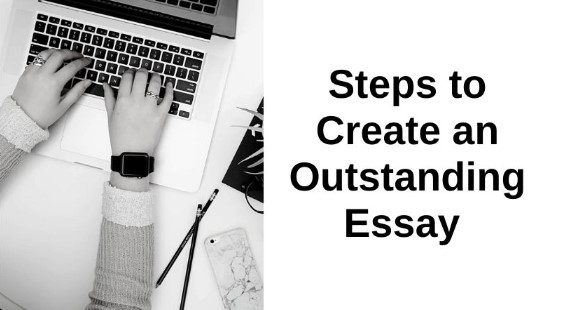Academic writing, especially, essay writing may look daunting at first. However, trust me, it is undeniably important to effectively develop critical thinking, research skills, and the ability to communicate complex ideas in students. Thus, it enables you to share your unique perspectives with others.
If you are a student and want to write an academic essay that actually stands out then you need to have a strong command of English grammar, a good vocabulary, and a solid understanding of the topic. And when you get a strong grip on these, here is a simple step-by-step guide that you can follow to create an outstanding essay for academic success.
7 Steps To Create an Outstanding Academic Essay
Writing an academic essay is simpler than you think, you just have to learn and follow the right steps and in no time you will surely start enjoying it.
- Analyse The Question
Most universities and institutes provide students with a question or statement that they need to answer or address in their essays. If you have a question, take a few minutes to analyze it before starting your essay. Determine what the examiner is asking and how you can best answer this query.
Assess whether the essay is based on discussion, analysis, definition, or comparison and how you are going to cover the essay. Once you have a rough map in your mind, it becomes easier to draft out your ideas.
On the other hand, if you have to choose a topic yourself, then choose a topic that best aligns with your interest and you already have some knowledge about it. This way, you don’t have to waste your time researching from a new angle.
- Draft The Argument
When brainstorming your ideas, clarify the point of view or perspective from which you will present your argument. Take a well-informed position on the topic and define a specific argument to share your insights on the question.
When you determine your argument at the very beginning of the essay, it helps you defend and prove your points more effectively. Moreover, it also helps you avoid contradictions between the ideas.
- Add Evidence, Reasonings, And Scholarships
In an academic essay, you have to provide evidence and reasoning for each discussed point to support your argument. Therefore, try to add references or evaluate scholarship related to your arguments, wherever possible. Here is a quick breakdown of the role of evidence, reasoning, and scholarships in writing:
- Evidence: These are verified concrete information that you include in your writing to verify your points. It can be presented in the form of specific examples, facts, quotations, statistics, and illustrations.
- Reasoning: It is like a bridge between your argument and the reasoning. For instance, if your essay includes details about shopping, then rather than citing the shopping list, you can simply evaluate the evidence and support your claims.
- Scholarship: It is used to determine how your argument relates to the topic or specifically cited work. You can think of scholarships as a part of your evidence and reasoning that helps you support your argument.
- Organize a Coherent Essay
After collecting all the necessary information and references, start organizing it in a logical way to frame your essay. An essay usually consists of three elements:
- Introduction
- Body
- Conclusion
Introduction
The introductory paragraph of your essay should effectively cover the entire essence of the content. It must give the reader a sneak into what the content is about and how you are going to present your argument. The introduction is the first interaction between your essay and the reader, and most readers decide whether to continue reading or leave the essay based on the pitch you make in this section. To grab their attention right away, make your introduction eye-catching and engaging.
Body
The body of the essay is where you explain your arguments and support your opinions with evidence and references. It is the real battleground where you have to prove your points right.
Therefore, break your argument into smaller objections and focus on discussing one idea in a sentence. This way, you can clearly lay your viewpoints without confusing the reader. Once you thoroughly explain one point with evidence, smoothly move on to the next paragraph to discuss the next idea.
Conclusion
The conclusion wraps up your essay by summarizing key points and reinforcing your overall argument effectively for the reader. So, when concluding the essay, don’t ever try to introduce any new point or idea. Instead, focus on concisely covering the essence of the content.
Remember, the conclusion must be so well-written that it leaves a lasting effect on the reader and gives a smooth closure to your essay.
- Revise And Edit
After completing your first draft, proofread it thoroughly. Revise and edit it multiple times until it is polished, clear, and error-free.
Firstly, look for bigger and more prominent mistakes such as structural errors, spelling mistakes, or inappropriate tone. After this, move on to the more critical part; grammatical and punctuation errors.
Although punctuations might look too small and almost negligible, trust me they can change the entire meaning of the sentence. Moreover, poor grammar and wrong punctuation can make you look unprofessional.
So to ensure accuracy, go through each of the sentences word by word, read it aloud, and ask yourself if it sounds fine to you. Try to keep an appropriate and consistent tone throughout the essay.
- Cite Sources And Evidence
Lastly, for every reference you add in your essay, you have to cite it properly and give the resource or creator their deserving credit. When citing the resource, you should look at your faculty guidelines to cite the resource in their preferred citation methods. For instance, some academies prefer the APA citation method while some prefer MLA or Chicago.
- Ensure uniqueness
Educators always appreciate unique and personalized content. Therefore, even if you draw inspiration from other resources, you should paraphrase them effectively to showcase your critical thinking and unique perspective. Remember, plagiarism is strictly prohibited in academic writing.
Therefore, to ensure you only submit original and plagiarism-free content, you can use a plagiarism checker online before submission. The plagiarism checker tool will mention if any point or even a single phrase in your content is plagiarised. Thus, you can rephrase it on time to maintain your academic integrity. This way, by committing to uniqueness, you boost your credibility and enhance the overall quality of your writing.
Final Words
Essay writing gets easier when you follow a clear plan and focus on what matters. Take it one step at a time and aim to communicate your ideas in a way that connects with your readers. Use every essay as a chance to improve your skills and share your perspective effectively. Success comes from practice and making your work meaningful and engaging. Keep refining your approach, and you’ll see the difference in your confidence and results.


